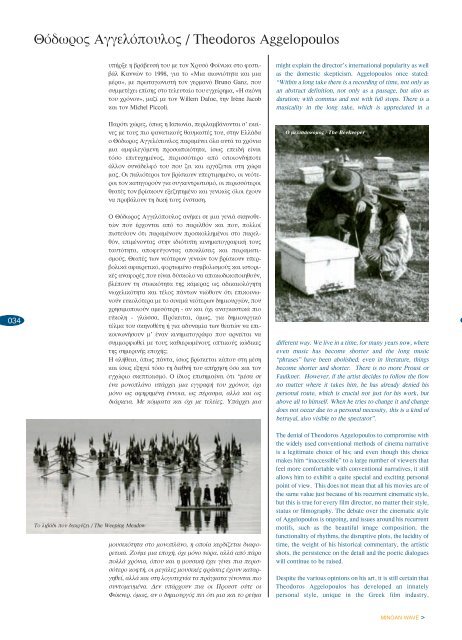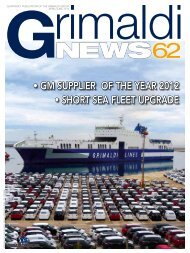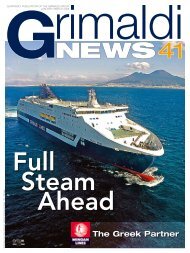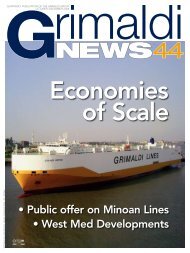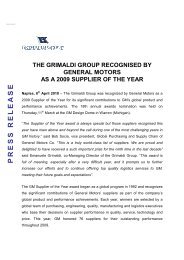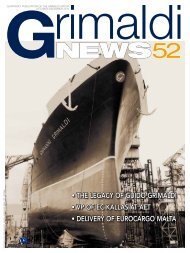Â˘Î¿‰· / Lefkada - Grimaldi Group
Â˘Î¿‰· / Lefkada - Grimaldi Group
Â˘Î¿‰· / Lefkada - Grimaldi Group
Create successful ePaper yourself
Turn your PDF publications into a flip-book with our unique Google optimized e-Paper software.
£fi‰ˆÚÔ˜ ∞ÁÁÂÏfiÔ˘ÏÔ˜ / Theodoros Aggelopoulos<br />
˘‹ÚÍÂ Ë ‚Ú¿‚Â˘Û‹ ÙÔ˘ Ì ÙÔÓ ÃÚ˘Ûfi ºÔ›ÓÈη ÛÙÔ ÊÂÛÙÈ-<br />
‚¿Ï ∫·ÓÓÒÓ ÙÔ 1998, ÁÈ· ÙÔ «ªÈ· ·ÈˆÓÈfiÙËÙ· Î·È ÌÈ·<br />
̤ڷ», Ì ڈٷÁˆÓÈÛÙ‹ ÙÔÓ ÁÂÚÌ·Ófi Bruno Ganz, Ô˘<br />
Û˘ÌÌÂÙ¤¯ÂÈ Â›Û˘ ÛÙÔ ÙÂÏÂ˘Ù·›Ô ÙÔ˘ ÂÁ¯Â›ÚËÌ·, «∏ ÛÎfiÓË<br />
ÙÔ˘ ¯ÚfiÓÔ˘», Ì·˙› Ì ÙÔÓ Willem Dafoe, ÙËÓ Irène Jacob<br />
Î·È ÙÔÓ Michel Piccoli.<br />
might explain the director’s international popularity as well<br />
as the domestic skepticism. Aggelopoulos once stated:<br />
“Within a long take there is a recording of time, not only as<br />
an abstract definition, not only as a passage, but also as<br />
duration; with commas and not with full stops. There is a<br />
musicality in the long take, which is appreciated in a<br />
·ÚfiÙÈ ¯ÒÚ˜, fiˆ˜ Ë π·ˆÓ›·, ÂÚÈÏ·Ì‚¿ÓÔÓÙ·È Û’ ÂΛ-<br />
Ó˜ Ì ÙÔ˘˜ ÈÔ Ê·Ó·ÙÈÎÔ‡˜ ı·˘Ì·ÛÙ¤˜ ÙÔ˘, ÛÙËÓ ∂ÏÏ¿‰·<br />
Ô £fi‰ˆÚÔ˜ ∞ÁÁÂÏfiÔ˘ÏÔ˜ ·Ú·Ì¤ÓÂÈ fiÏ· ·˘Ù¿ Ù· ¯ÚfiÓÈ·<br />
ÌÈ· ·ÌÊÈÏÂÁfiÌÂÓË ÚÔÛˆÈÎfiÙËÙ·, ›Ûˆ˜ ÂÂȉ‹ ›ӷÈ<br />
ÙfiÛÔ ÂÈÙ˘¯Ë̤ÓÔ˜, ÂÚÈÛÛfiÙÂÚÔ ·fi ÔÔÈÔÓ‰‹ÔÙÂ<br />
¿ÏÏÔÓ Û˘Ó¿‰ÂÏÊfi ÙÔ˘ Ô˘ ˙ÂÈ Î·È ÂÚÁ¿˙ÂÙ·È ÛÙË ¯ÒÚ·<br />
Ì·˜. √È ·ÏÈfiÙÂÚÔÈ ÙÔÓ ‚Ú›ÛÎÔ˘Ó ˘ÂÚÙÈÌË̤ÓÔ, ÔÈ ÓÂfiÙÂ-<br />
ÚÔÈ ÙÔÓ Î·ÙËÁÔÚÔ‡Ó ÁÈ· Û˘ÁÎÂÓÙÚˆÙÈÛÌfi, ÔÈ ÂÚÈÛÛfiÙÂÚÔÈ<br />
ı·٤˜ ÙÔÓ ‚Ú›ÛÎÔ˘Ó ÂÍÂ˙ËÙË̤ÓÔ Î·È ÁÂÓÈÎÒ˜ fiÏÔÈ ¤¯Ô˘Ó<br />
Ó· ÚÔ‚¿ÏÔ˘Ó ÙË ‰È΋ ÙÔ˘˜ ¤ÓÛÙ·ÛË.<br />
√ ÌÂÏÈÛÛÔÎfiÌÔ˜ / The Beekeeper<br />
034<br />
∆Ô ÏÈ‚¿‰È Ô˘ ‰·ÎÚ‡˙ÂÈ / The Weeping Meadow<br />
√ £fi‰ˆÚÔ˜ ∞ÁÁÂÏfiÔ˘ÏÔ˜ ·Ó‹ÎÂÈ Û ÌÈ· ÁÂÓÈ¿ ÛÎËÓÔıÂ-<br />
ÙÒÓ Ô˘ ¤Ú¯ÔÓÙ·È ·fi ÙÔ ·ÚÂÏıfiÓ Î·È Ô˘, ÔÏÏÔ›<br />
ÈÛÙÂ‡Ô˘Ó fiÙÈ ·Ú·Ì¤ÓÔ˘Ó ÚÔÛÎÔÏÏË̤ÓÔÈ ÛÙÔ ·ÚÂÏıfiÓ,<br />
ÂÈ̤ÓÔÓÙ·˜ ÛÙËÓ È‰ÈfiÙ˘Ë ÎÈÓËÌ·ÙÔÁÚ·ÊÈ΋ ÙÔ˘˜<br />
Ù·˘ÙfiÙËÙ·, ·ÔʇÁÔÓÙ·˜ ·ÔÎÏ›ÛÂȘ Î·È ÂÈÚ·Ì·ÙÈ-<br />
ÛÌÔ‡˜. £Â·Ù¤˜ ÙˆÓ ÓÂfiÙÂÚˆÓ ÁÂÓÂÒÓ ÙÔÓ ‚Ú›ÛÎÔ˘Ó ˘ÂÚ-<br />
‚ÔÏÈο ·Ê·ÈÚÂÙÈÎfi, ÊÔÚو̤ÓÔ Û˘Ì‚ÔÏÈÛÌÔ‡˜ Î·È ÈÛÙÔÚÈ-<br />
Τ˜ ·Ó·ÊÔÚ¤˜ Ô˘ Â›Ó·È ‰‡ÛÎÔÏÔ Ó· ·ÔΈ‰ÈÎÔÔÈËıÔ‡Ó,<br />
‚Ï¤Ô˘Ó ÙË ÛÙˆÈÎfiÙËÙ· Ù˘ οÌÂÚ·˜ ˆ˜ ·‰ÈηÈÔÏfiÁËÙË<br />
Óˆ¯ÂÏÈÎfiÙËÙ· Î·È Ù¤ÏÔ˜ ¿ÓÙˆÓ ÓÈÒıÔ˘Ó fiÙÈ ÂÈÎÔÈÓˆ-<br />
ÓÔ‡Ó Â˘ÎÔÏfiÙÂÚ· Ì ÙÔ ÛÈÓÂÌ¿ ÓÂfiÙÂÚˆÓ ‰ËÌÈÔ˘ÚÁÒÓ, Ô˘<br />
¯ÚËÛÈÌÔÔÈÔ‡Ó ·ÌÂÛfiÙÂÚË - ·Ó Î·È fi¯È ·Ó·ÁηÛÙÈο ÈÔ<br />
‡ÎÔÏË - ÁÏÒÛÛ·. ÚfiÎÂÈÙ·È, fï˜, ÁÈ· ‰ËÌÈÔ˘ÚÁÈÎfi<br />
Ù¤ÏÌ· ÙÔ˘ ÛÎËÓÔı¤ÙË ‹ ÁÈ· ·‰˘Ó·Ì›· ÙˆÓ ı·ÙÒÓ Ó· ÂÈ-<br />
ÎÔÈÓˆÓ‹ÛÔ˘Ó Ì’ ¤Ó·Ó ÎÈÓËÌ·ÙÔÁÚ¿ÊÔ Ô˘ ·ÚÓÂ›Ù·È Ó·<br />
Û˘ÌÌÔÚʈı› Ì ÙÔ˘˜ ηıÈÂڈ̤ÓÔ˘˜ ÔÙÈÎÔ‡˜ ÎÒ‰ÈΘ<br />
Ù˘ ÛËÌÂÚÈÓ‹˜ ÂÔ¯‹˜;<br />
∏ ·Ï‹ıÂÈ·, fiˆ˜ ¿ÓÙ·, ›Ûˆ˜ ‚Ú›ÛÎÂÙ·È Î¿Ô˘ ÛÙË Ì¤ÛË<br />
Î·È ›Ûˆ˜ ÂÍËÁ› ÙfiÛÔ ÙË ‰ÈÂıÓ‹ ÙÔ˘ ·‹¯ËÛË fiÛÔ Î·È ÙÔÓ<br />
ÂÁ¯ÒÚÈÔ ÛÎÂÙÈÎÈÛÌfi. √ ›‰ÈÔ˜ ÂÈÛËÌ·›ÓÂÈ fiÙÈ “̤۷ ÛÂ<br />
¤Ó· ÌÔÓÔÏ¿ÓÔ ˘¿Ú¯ÂÈ ÌÈ· ÂÁÁÚ·Ê‹ ÙÔ˘ ¯ÚfiÓÔ˘, fi¯È<br />
ÌfiÓÔ ˆ˜ ·ÊËÚË̤ÓË ¤ÓÓÔÈ·, ˆ˜ ¤Ú·ÛÌ·, ·ÏÏ¿ Î·È ˆ˜<br />
‰È¿ÚÎÂÈ·. ªÂ ÎfiÌÌ·Ù· Î·È fi¯È Ì ÙÂÏ›˜. À¿Ú¯ÂÈ ÌÈ·<br />
ÌÔ˘ÛÈÎfiÙËÙ· ÛÙÔ ÌÔÓÔÏ¿ÓÔ, Ë ÔÔ›· ÎÂÚ‰›˙ÂÙ·È ‰È·ÊÔ-<br />
ÚÂÙÈο. ∑ԇ̠ÌÈ· ÂÔ¯‹, fi¯È ÌfiÓÔ ÙÒÚ·, ·ÏÏ¿ ·fi ¿Ú·<br />
ÔÏÏ¿ ¯ÚfiÓÈ·, fiÔ˘ Î·È Ë ÌÔ˘ÛÈ΋ ¤¯ÂÈ Á›ÓÂÈ È· ÂÚÈÛ-<br />
ÛfiÙÂÚÔ ÎÔÊÙ‹, ÔÈ ÌÂÁ¿Ï˜ ÌÔ˘ÛÈΤ˜ ÊÚ¿ÛÂȘ ¤¯Ô˘Ó ηٷÚ-<br />
ÁËı›, ·ÏÏ¿ Î·È ÛÙË ÏÔÁÔÙ¯ӛ· Ù· Ú¿ÁÌ·Ù· Á›ÓÔÓÙ·È ÈÔ<br />
Û˘ÓÙÔÌÂ˘Ì¤Ó·. ¢ÂÓ ˘¿Ú¯Ô˘Ó È· ÔÈ ÚÔ˘ÛÙ Ô‡Ù ÔÈ<br />
ºÒÎÓÂÚ. fï˜, ·Ó Ô ‰ËÌÈÔ˘ÚÁfi˜ ÂÈ fiÙÈ ÌÈ· Î·È ÙÔ Ú‡̷<br />
different way. We live in a time, for many years now, where<br />
even music has become shorter and the long music<br />
“phrases” have been abolished; even in literature, things<br />
become shorter and shorter. There is no more Proust or<br />
Faulkner. However, if the artist decides to follow the flow<br />
no matter where it takes him, he has already denied his<br />
personal route, which is crucial not just for his work, but<br />
above all to himself. When he tries to change it and change<br />
does not occur due to a personal necessity, this is a kind of<br />
betrayal, also visible to the spectator”.<br />
The denial of Theodoros Aggelopoulos to compromise with<br />
the widely used conventional methods of cinema narrative<br />
is a legitimate choice of his; and even though this choice<br />
makes him “inaccessible” to a large number of viewers that<br />
feel more comfortable with conventional narratives, it still<br />
allows him to exhibit a quite special and exciting personal<br />
point of view. This does not mean that all his movies are of<br />
the same value just because of his recurrent cinematic style,<br />
but this is true for every film director, no matter their style,<br />
status or filmography. The debate over the cinematic style<br />
of Aggelopoulos is ongoing, and issues around his recurrent<br />
motifs, such as the beautiful image composition, the<br />
functionality of rhythms, the disruptive plots, the lucidity of<br />
time, the weight of his historical commentary, the artistic<br />
shots, the persistence on the detail and the poetic dialogues<br />
will continue to be raised.<br />
Despite the various opinions on his art, it is still certain that<br />
Theodoros Aggelopoulos has developed an innately<br />
personal style, unique in the Greek film industry,<br />
MINOAN WAVE >>


